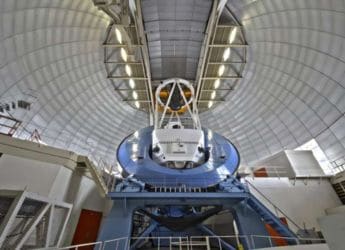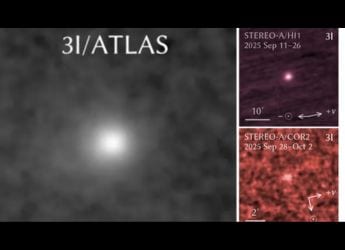- Home
- Science
- Science News
- Is the Universe Slowing Down? Astronomers Detect Signs of Fading Dark Energy
Is the Universe Slowing Down? Astronomers Detect Signs of Fading Dark Energy
Astronomers analysing supernova and DESI data suggest dark energy—the mysterious force accelerating cosmic expansion—may be weakening. If confirmed, this could explain the Hubble tension and imply the universe’s expansion is slowing, reshaping our understanding of its long-term fate.

Photo Credit: Marilyn Sargent/Berkeley Lab
DESI is a state-of-the-art instrument which maps distant objects to study dark energy.
For decades, astronomers have believed that the universe's expansion is not only ongoing but accelerating, driven by a mysterious force called dark energy. However, new research suggests this acceleration may be slowing. By correcting for biases in supernova data and combining results from other surveys, scientists are finding stronger hints that dark energy might be weakening over time. This finding could reshape our understanding of the cosmos and its ultimate fate.
Changing Dark Energy: What the Evidence Shows
As per a recent paper by researchers from Yonsei University, recent analyses from the Dark Energy Spectroscopic Instrument (DESI) give an indication that the dark energy could be evolving. The conventional model of ΛCDM presupposed that dark energy is a cosmological one. But once the type Ia supernovae data had been adjusted to the age of the host galaxy, the indication of continuing acceleration began to fall apart, and the results became more consistent with a model where the strength of the dark energy is declining with time-a cosmic slowdown.
What It Means for the Universe
In case the dark energy is evaporating, the expansion of the universe may eventually slow down instead of accelerating indefinitely. This changing-energy model can also solve the so-called Hubble tension, or the conflict between the various measurements of the rate of the universe's expansion. Though the results are tentative, future observations such as the Nancy Grace Roman Telescope of NASA and the Euclid of the ESA will determine whether the dark energy is actually time-varying or not. There is a possibility that cosmology will be forced to reconsider one of its most fundamental forces, in case it is confirmed.
Get your daily dose of tech news, reviews, and insights, in under 80 characters on Gadgets 360 Turbo. Connect with fellow tech lovers on our Forum. Follow us on X, Facebook, WhatsApp, Threads and Google News for instant updates. Catch all the action on our YouTube channel.
Related Stories
- Samsung Galaxy Unpacked 2025
- ChatGPT
- Redmi Note 14 Pro+
- iPhone 16
- Apple Vision Pro
- Oneplus 12
- OnePlus Nord CE 3 Lite 5G
- iPhone 13
- Xiaomi 14 Pro
- Oppo Find N3
- Tecno Spark Go (2023)
- Realme V30
- Best Phones Under 25000
- Samsung Galaxy S24 Series
- Cryptocurrency
- iQoo 12
- Samsung Galaxy S24 Ultra
- Giottus
- Samsung Galaxy Z Flip 5
- Apple 'Scary Fast'
- Housefull 5
- GoPro Hero 12 Black Review
- Invincible Season 2
- JioGlass
- HD Ready TV
- Laptop Under 50000
- Smartwatch Under 10000
- Latest Mobile Phones
- Compare Phones
- Huawei Mate 70 Air
- Moto G57
- Moto G57 Power
- Motorola Edge 70
- Moto G Play (2026)
- Moto G (2026)
- Realme C85 Pro 4G
- Realme C85 5G
- MacBook Pro 14-inch (M5, 2025)
- Asus Vivobook S16 (S3607QA)
- iQOO Pad 5e
- OPPO Pad 5
- Garmin Venu X1
- Redmi Watch 6
- TCL 55 Inch QD-Mini LED Ultra HD (4K) Smart TV (55Q6C)
- TCL 55 Inch QD-Mini LED Ultra HD (4K) Smart TV (55C6K)
- Asus ROG Ally
- Nintendo Switch Lite
- Haier 1.6 Ton 5 Star Inverter Split AC (HSU19G-MZAID5BN-INV)
- Haier 1.6 Ton 5 Star Inverter Split AC (HSU19G-MZAIM5BN-INV)

















